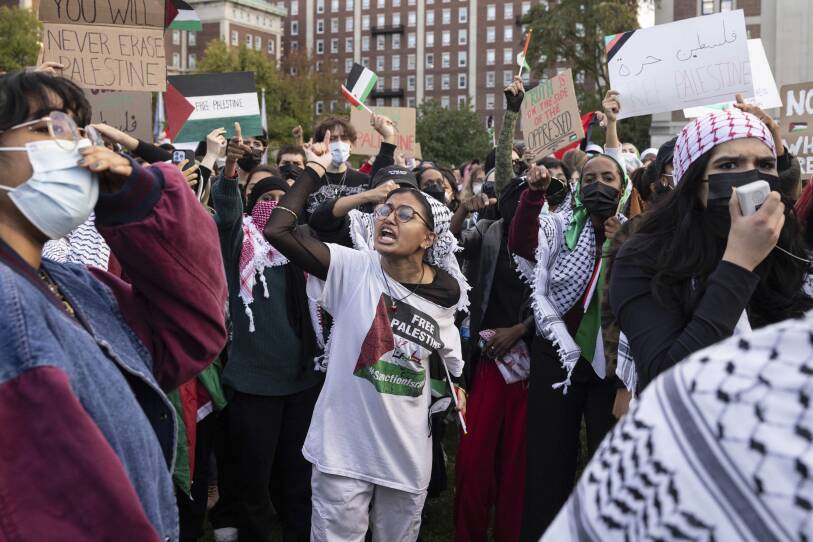The number of Harvard professors who signed a petition in support of embattled college president Claudine Gay topped more than 700 as of Monday afternoon.
The petition, which circulated over the weekend, asks Harvard's governing boards to “resist political pressures that are at odds with Harvard’s commitment to academic freedom.”
“The independent university is a critical part of a healthy, vibrant democracy in which many different viewpoints can coexist,” said Harvard history professor Allison Frank Johnson, who helped to organize the petition. “It shows that faculty with widely divergent opinions on matters of national and university politics, not to mention the situation in Israel and Palestine, agree on that point.”
The Harvard Corporation, the oversight body that oversees administrative function of the university, has also rejected calls for Gay's ouster.
The Harvard Corporation announced its decision in a statement on Monday, saying: "we unanimously stand in support of President Gay and we are united in our strong belief that calls for violence against our students ... will not be tolerated."
Gay's supporters hope to blunt efforts by alumni, donors and others to remove her following her testimony on antisemitism before Congress last week. Seventy-four members of Congress called on the governing boards of Harvard, MIT and the University of Pennsylvania to remove their college presidents, saying their congressional testimony last week failed to resoundingly denounce antisemitism on their respective campuses.
UPenn President Liz Magill tendered her resignation over the weekend, though the university announced she will continue to serve in the role until an interim president is named.
Harvard faculty members said they did not want Gay to meet a similar fate, but the campus community remains deeply divided.
Rabbi David Wolpe, a visiting scholar at Harvard Divinity School, stepped down last week from Harvard’s antisemitism advisory committee.
In an interview with GBH News, Wolpe said all three presidents failed “a test of vision” when they took a vague stance on language involving genocide.
He said he did not sign the petition circulating in support of Gay, saying he takes no position on who should stay or who should leave.
"The purpose of a university president is less to lay down the law than it is to create the vision of the path forward," he said. "And we didn't hear that in the hearings, and that was painful and disappointing."
In announcing his resignation on the social media platform X , Wolpe said: “We are at a point when the toxicity of intellectual slovenliness has been laid bare for all to see.”
When asked to clarify, he said: “When you don't think clearly it has some very bad implications. It's not just that you get an answer wrong on the test, it's that you come to believe things about history, about people, about groups that are simply not true. And you don't care because it fits into a slogan or protest. And we're seeing that over and over again, and it's destructive.”

Since the Oct. 7 attacks by Hamas on Israel, activists on college campuses have chanted slogans like “from the river to the sea” and “global intifada” during campus protests, in some cases disrupting classes. Pro-Palestinian groups claim those phrases describe resistance; pro-Israeli groups say they’re calling for violence.
The presidents of Harvard, MIT and the University of Pennsylvania were asked to testify before the House Education and Workforce Committee about such incidents last week, which led to a grilling by U.S. Rep. Elise Stefanik, a Republican from New York. She asked whether calling for the genocide of Jews violated the colleges rules regarding bullying or harassment.
The three presidents offered lawyerly answers that equivocated and caused a bipartisan uproar with far-reaching implications.
Lynn Pasquerella, president of the American Association of Colleges and Universities and the former president of Mount Holyoke College, said the hearing showed how college presidents find themselves stuck in the middle, sometimes playing referee, while balancing free speech and public safety.
“Even before the hearings, there was always a balancing act between a president's obligation to support academic freedom, the free exchange of ideas, the unfettered pursuit of the truth, which sometimes allows for unwelcome hate speech,” she said, “and has to be weighed against their duty to ensure that everyone has equal access to a learning environment where they can thrive.”
Pasquerella added that the congressional hearings weren’t a farce — they were part of “a broader, orchestrated effort to discredit diversity, equity and inclusion and to dismantle higher education over a perceived anti-conservative bias.”
The presidents who testified did what they were instructed to do by lawyers, she said, but missed the mark and became symbols of a system of higher education that is viewed as elitist and out of touch.
“This has been a part of a playbook that has positioned colleges and universities as bastions of liberal progressivism that are brainwashing the next generation of snowflakes,” she said.
Looking forward, Pasquerella said she wouldn't predict whether Claudine Gay would outlast the controversy. And she said she worries about the lasting effect on higher education in the United States, noting that the hearings were political theater, but "theater that we need to take very seriously.”
Rabbi David Wolpe agreed that the hearing was performative. He said if colleges want to restore people’s faith in their institutions of higher learning, it’s up to the college presidents to lead the way.
"I think that the hearings did confirm what people feared about these places, which is that they are ideological factories that have fences around them and it's really hard sometimes to get people to break the mold or to speak bluntly and clearly,” he said.
Clear thinking, he said, is what campuses need right now.





